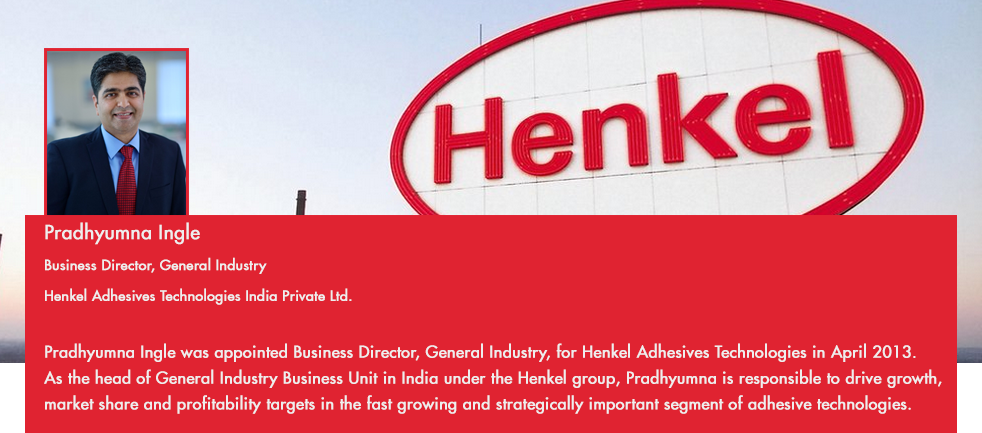
-
Henkel Adhesive has recently commissioned a largest plant in Pune, please throw some light on the project?
Henkel in India is setting up the country’s largest adhesives plant at Kurkumbh, near Pune, which will be operational by mid-2018. The new manufacturing unit is being built in phases, and Henkel has invested EUR 28 million (about INR 220 crore) for setting up the first phase of the plant. In the first phase, the state-of-the-art, multi-technology manufacturing facility, will have an operational area of about 20,000 square meters with an annual capacity of about 80,000 metric tonnes of adhesives and surface treatment products.
Henkel’s Kurkumbh plant is a very important milestone of our journey in India. This plant will enable us to localize our product portfolio and reduce imports while bringing the best global technology to India. Considering the proximity of the plant to our customers, it will also help us to work closely with them in developing solutions. We are aiming to win a greater market share in India, which is one of the biggest emerging markets for us. Henkel’s Kurkumbh plant will be a model for sustainability and efficiency. The plant will be LEED certified and will follow the highest standards of Safety, Health & Environment. This will ensure best-in-class services for our customers, and at the same time ensure quality, improve productivity and efficiency.
-
Henkel’s plans for future diversification/ expansion
Henkel has innovation in its DNA, and consistently works to cater to customers’ pain points. New product development and their marketability is what sets us apart in the market. The new products that the General Industry Adhesives business plans to launch in the near future will cater to the maintenance, repair and overhaul customers.
-
Any new products launch? Tell us about them.
India holds a strategic position for Henkel as a part of the company’s long-term growth strategy.
Catering to the growing demand in the market, we recently launched two products, LOCTITE® HY 4060GY™ and LOCTITE® HY 4090™ at Structural Bonding Conference at Pune’s Auto Cluster Exhibition Centre. The event was a grand success and witnessed participation from more than 150 customers from across industries. The conference was conducted in two parts. The first half saw presentations by Henkel experts and representatives from Graco and IEEC, which are Henkel’s partners in adhesive dispensing solutions and surface preparation respectively; while in the second half the customers got to have first-hand experience with the Henkel’s Structural Bonding solutions and solutions from Henkel’s partners Graco, Kuka and IEEC. The Hybrid launch was followed by a live demonstration where a 70 mm cross-section assembly which was bonded using 0.3 grams of Loctite Hybrid Adhesives. This was done in front of the audience and then this assembly was allowed 1 hour to cure. Post the completion of the 1 hour, a load of 624 kg was hooked to the same bonded assembly and pulled up with a crane. The assembly successfully pulled up the 624 kg weight, to the amazement and delight of the audience, with just 0.3 grams of Loctite Hybrid Adhesive. The excitement that the demonstration stirred among the spectators was palpable in the discussion that they further had with the Henkel representatives on prospective avenues on Structural Bonding adhesives.
LOCTITE® HY 4060GY™ and LOCTITE® HY 4090™ are next generation universal structural bonders, powered by a patented hybrid technology, that combines the most critical attributes of structural, instant and epoxy adhesives. These hybrid adhesives offer excellent bond strength, fixture speed, substrate versatility, reliability, durability, and improved health and safety benefits for users; thus, enabling simplification of production process, reduction of costs and improving efficiency.
LOCTITE Universal Structural Bonders are designed to reach beyond conventional approaches, and help tackle the most challenging assembly and repair situations. The powerful combination of two technologies in one product provides improved performance on a variety of substrates, and the versatility to solve a wide range of maintenance, repair, design and assembly challenges.
-
How do you assess the market scenario in India and change in the policies in FDI recently?
We see India as a high potential market, with adhesives being used in almost every sector including manufacturing, renewable energy, auto, aviation, construction, FMCG and healthcare among many others. As market leaders, we intend to take on the challenge of converting the latent potential into actual market.
Our investments in building India’s largest adhesive plant at Kurkumbh, near Pune and in expanding the capabilities of our Innovation centre at Pune bear testimony to our commitment to the Indian market. By moving innovation capabilities and production sites close to our growing customer base in India, we have been able to provide local solutions while leveraging global technologies and expertise.
We drive powerful innovations and develop leading technologies that create value for our customers. Setting up of the Henkel India Innovation centre at Pune was yet another step in strengthening our relationship with our customers. It enables us to provide an integrated one-stop for adhesive technologies, testing facilities, dispensing systems and application training. Henkel plans to consolidate its position as the largest industrial adhesive manufacturer and supplier in India.
India’s manufacturing sector could touch USD 1 trillion by 2025, according to India Brand Equity Foundation. This sector has the potential to account for 25-30 percent of the country’s GDP by 2025. India is becoming increasingly influential in the global market place. The recent changes in FDI policies, is a welcome move for the manufacturing sector, as subject to the provisions of the FDI policy, foreign investment in “manufacturing sector” is under automatic route. Foreign direct investments and investments in industrial production will witness a further surge. The investments by multi-national companies in India will also increase, as these companies see the potential that exists in the country.